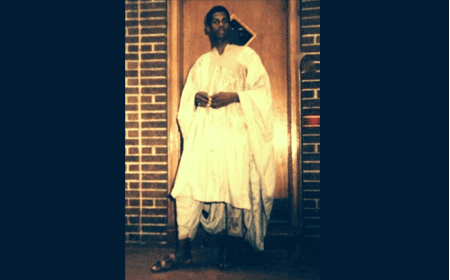Belize City in the 1960s and 70s was a soulful little place. A predominantly black city in the heart of the former British Honduras, whose descendants came from the depths of the British colonial mahogany camps. And whose ancestors and descendants alike were taught to dream beyond the narrow confines of its city walls, to become revolutionized kinds of minds like Kimani Trapp-Davis, who had left Belizean shores to then return home with a kind of ancestors’ spirit that appeared strange but somewhat liberating to many who connected with it.
There was a club in Belize City at the corner of West and Glynn Street called, “Harlem Square”, that used to serenade some memorable 1960s and 70s black music from off the Top 10 United States musical charts. This music was not heard on the government monopoly Radio Belize, and it reflected a kind of a little New York “Harlem” image in Belize City where many of the Belize City footballers, entertainers, and personalities would hang out. Harlem Square’s” mark of class was a mango tree in its yard that had bottles of liquor hanging from it and decorated with Christmas tree lights.
Around there you would also see some of the brothers who were a part of Belize’s black power movement called the “United Black Association for Development” (UBAD). For many Belizean parents, UBAD was bad news, and when my father in the late 60s would scold my sisters about wanting to go to “knock their own thing” at the UBAD fundraiser dances, it was an exciting time for me as a youth to hear the rich conversations of the Belizean black power movement and that aura of consciousness that was there on the now called “Southside” of Belize City.
Because UBAD also held public meetings in front of Harlem Square some nights, you would see Belizean personalities like his highness, Kimani, around there walking with a kind of proud and flamboyant kingly like character. He always held a black beautiful wooden carved design stick or cane in his right hand. He was dressed always elegantly in 60s U.S. black consciousness attire, since he would come back to Belize from the States occasionally. He was a tall brother that carried himself with a serious swagger, a no-nonsense attitude that also showed a kind of martial artist “rude boy” cult of personality.
Sketches of Kimani, the Belizean soul brother of Belize City, still permeate my mind even up to today, and sometimes pop up into conversations yours truly would have with one of Kimani’s younger martial arts admirers in the 70s, my good Belizean friend Greg Sheran, who has some vivid memories of the days when many young boys from his ‘hood would just follow Kimani around the city and became part of his group of martial artists.
But apart from the martial arts that had become one of Kimani’s qualities as a 1960s Belizean figure, he also appeared to be a passionate black consciousness elder among us Belizean youths who had returned from the U.S. as a Belizean immigrant there. And like some of the brothers in the UBAD black consciousness group in a 1960s Belize, Kimani had been revolutionized by the influence of America’s civil rights and “Black Panther” struggle. From time to time he even wore a black beret rocking the Black Panther signature around Belize City streets, and would be seen walking majestically hailing Belizean friends and giving the time of the day to Belizean folk who stared at him as if he was some kind of gladiator of power and prestige.
As the years went by through the 1970s and 80s, it appeared that Kimani had passed away in the U.S. and his soul brother image that once traversed the streets of Belize City had suddenly disappeared like a mirage from the memories of most of us Belizeans who knew him or had once seen him in town. He left an everlasting memory among many of us who were Belizean youths at the time, of his stylish and soul brother like persona. Thus many Belizean women who knew him started to call their baby boys, Kimani!
He was that undisputed “Belizean Soul Brother”!
(Photo through the courtesy of the legendary Belizean footballer Ray Davis)

